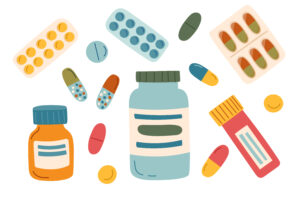A significant portion of the American population, particularly older adults (17-28%), are frequently plagued by dehydration [1].
It’s a condition that can develop easily due to a range of causes, from forgetting to drink due to work to medical conditions like diarrhea, fever, and diabetes [2]. Dehydration IV fluids can be an effective solution.
However, before we discuss how intravenous therapy can be beneficial and answer questions like “What is in an IV for dehydration?” let’s first examine what exactly transpires within our bodies when they lack sufficient hydration.
Understanding Dehydration: Symptoms and Causes
Our bodies are somewhere between 50 and 75% water at any moment [3]. This life-giving liquid plays numerous roles that sustain our health and well-being. For instance, it keeps our joints bending by providing lubrication, much like oil does for a car engine.
When we are dehydrated, our bodies are essentially running dry. It indicates that we’re losing more fluid than we’re drinking or consuming in other forms. This imbalance can result in the disruption of vital minerals and normal bodily functions.
Dehydration can manifest itself through a variety of symptoms. These signs are your body’s way of signaling that it needs more fluids. According to the National Health Service, these are some common indicators to look out for [4]:
- A persistent sense of thirst and a feeling of lightheadedness
- Experience dry mouth often
- Feeling tired without any significant physical exertion
- Dark-colored urine with a strong odor
- Reduced frequency of urination
In severe cases, dehydration may escalate and present more serious symptoms such as:
- Unexplained fatigue or lethargy coupled with confusion
- A weak or rapid pulse, which is a sign of potential heart stress
- Seizures, which are uncontrolled electrical disturbances in the brain
- Lowered levels of consciousness
The good news is that IV dehydration treatment presents a potentially effective route toward managing even chronic dehydration issues, extending a pathway for those seeking to regain optimal hydration levels. But, how exactly do IV fluids for dehydration work?
The Role of IV Therapy in Combatting Dehydration: Everything You Need to Know
Intravenous or IV therapy is a method of delivering fluids directly into the bloodstream, bypassing the digestive system. This allows for immediate and efficient absorption of hydration, vitamins, and other essential nutrients in our body.
One major component of IV fluid for dehydration is a saline solution – a sterile mixture of sodium chloride (table salt) and water that mimics your body’s natural fluid balance. Other elements like potassium and glucose may also be added according to individual needs.
Here’s how dehydration IV therapy works: it replenishes lost fluids in your body swiftly and restores you back to feeling healthy and hydrated more quickly than drinking water or sports drinks could.
Even better, there are other benefits that IV therapy can offer, including:
- Immediate hydration: The fluids are introduced directly into the bloodstream, so they work faster than drinking water.
- Electrolyte balance restoration: The added minerals help to re-establish the right balance in your body.
- Quick relief from symptoms: Many people report feeling better within hours after receiving treatment.
As for who needs it, anyone suffering from moderate to severe dehydration can benefit from this treatment.
However, it is especially helpful for individuals who have difficulty retaining fluids due to conditions like gastroenteritis, food poisoning, or even chronic illness. It is also commonly used in high-performance athletes and people who are frequently exposed to extreme heat.
Remember, while dehydration IV therapy can be a helpful tool in managing hydration levels, it should not replace regular water intake and maintaining a balanced diet. Regular check-ups with your healthcare provider will ensure you’re on the right track towards optimal health.
Types of IV Fluids Used for Dehydration Treatment
Understanding the type of fluids used in IV therapy is crucial. While you might wonder which IV fluid is best for dehydration or what is in an IV bag for dehydration, it largely depends on your body’s specific needs and condition.
Here are some common types:
- Normal Saline: This solution matches your blood’s salt concentration [5].
- Lactated Ringer’s: It contains potassium and lactate, ideal for restoring electrolyte balance [6].
- Dextrose 5% in Water: A mix of sugar and water that provides both hydration and calories [7].
Your healthcare provider will determine the best IV fluid for dehydration based on your individual needs and medical condition. Always ensure to discuss this with them during your consultation.
How Much IV Fluid For Dehydration Is Needed?
The amount of IV fluid for dehydration varies greatly from person to person, with factors such as age, weight, and severity of dehydration playing a significant role.
However, it’s not uncommon for the quantity to range anywhere between 500 mL to three liters per day. Whether you’re wondering what is in an IV bag or how many bags of IV fluid for dehydration are needed, remember that it’s the same answer; everything depends on your healthcare provider’s assessment of your specific condition.
The Duration of a Dehydration Therapy Session
How long does an IV drip take for dehydration? Typically, it takes about one to two hours for a standard bag of IV fluids to be administered. However, the exact duration can vary based on several factors.
These include the volume of fluid required, the individual’s overall health status, and how their body responds to the treatment.
Final Thoughts
In the end, the best IV solution for dehydration depends heavily on personal health factors and medical assessments.
Also, while dehydration IV therapy can be a powerful tool in managing hydration levels, it is essential to remember the importance of maintaining regular water intake and seeking professional help when symptoms persist or worsen.
If you’re interested in learning more about how IV dehydration treatment could benefit your specific situation, don’t hesitate to contact Legere Pharmaceuticals today.
FAQs:
IV fluids for dehydration typically contain saline (sodium chloride and water) to restore fluid balance. Depending on individual needs, other components like potassium, glucose, or lactate may be added to help replenish electrolytes and provide energy. Some formulations may also include IV supplements like alpha lipoic acid, provided by private label supplement manufacturers to enhance recovery.
The number of IV fluid bags required depends on the severity of dehydration and individual factors like weight and age. For severe dehydration, treatment typically involves administering 100 mL per kilogram of body weight. A healthcare provider will determine the total amount needed and divide it over several hours using multiple IV fluid bags as necessary, often sourced from specialized IV therapy supplies.
IV fluids for dehydration include isotonic, hypotonic, and hypertonic solutions. Isotonic fluids like Normal Saline and Lactated Ringer’s are the most common, restoring fluid balance and electrolytes. Hypotonic fluids, such as Half-Normal Saline, help rehydrate cells, while hypertonic fluids like 3% saline treat severe sodium deficiencies. The choice depends on individual hydration needs and medical conditions.

Dr .Taylor Froiland
President of Legere Pharmaceuticals
Taylor Froiland is the president of Legere Pharmaceuticals in Scottsdale, Arizona and serves on the Board of Directors for RK Logistics Group. He also owns and operates Medmetrics Compounding Pharmacy in Chandler, Arizona, specializing in various pharmaceutical services. Taylor holds a PharmD and has expertise in compounding, medicinal chemistry, and quality control.




